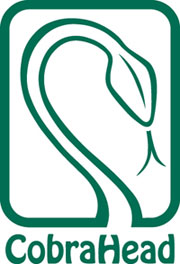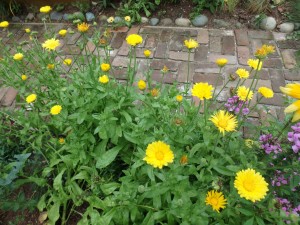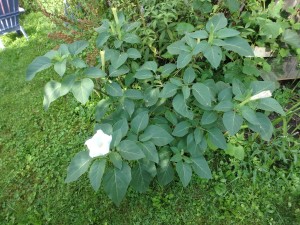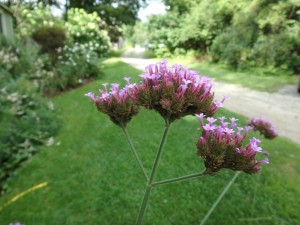Free Flowers!
Right now my front walkway is dominated by annual flowers, many of them that I did not plant – not this year, anyhow. First and foremost are the calendula. These are wonderful bright yellow flowers in the composite family, like daisies or sunflowers. They blossom and then drop seeds on the soil so they come back every year.
To have a nice supply of calendula, all I had to do was leave some of the seedlings to develop this spring. The seedlings are easy to identify: their color is a bright green the color of young lettuce. I removed many, but left a dozen or so. Right now they are gorgeous.
Another of my annual favorites that seeds itself is a big, bodacious flower with white blossoms that are often more than 6 inches long and shaped like a trumpet: Angel’s trumpet or Datura. It comes in both white and purple forms, though I have not been impressed with the purple ones – they are much less vigorous, with fewer blossoms.
Angel’s trumpet is my substitute for Asiatic and Oriental lilies which I can no longer grow- they are consumed and ruined by an invasive red beetle. Unlike the true lilies, Angel’s trumpet is not bothered by the beetles and blooms all summer. I have read that the seeds and flowers are poisonous – they produce severe hallucinations. But the seeds come in spiny covering, so few kids or animals are likely to want to put them in their mouths.
When I see their distinctive leaves in the spring I move them to a place where I have space for a plant that is often 4 or 5 feet across and 2 to 3 feet tall. Some years I get plenty of “babies”, other years I do not. They grow best in full sun to part shade in rich soil that stays a little moist.
Also on my front walkway is a tall plant with tough, thin, wiry stalks that often reach 4 to 5 feet, Brazilian verbena (Verbena bonariensis). In our climate this is an annual, but back home in South America it is a perennial. It has reddish-blue flowers, usually in groups of 3 at the tops of the stems. It rarely needs to be staked.
Its spring leaves, important to recognize if you want free flowers, are in pairs with serrated edges and roughly the shape of an elongated tennis racket. Look hard at the leaves now, noting the color and texture – even though the mature leaves are greatly elongated.
Of course, if you want to get flowers to self-sow, you must allow seeds to fall on bare soil. Even a 1 or 2 inch layer of mulch will prevent most seeds from finding a home and growing. If you are well mulched, you will need to monitor the seeds so you can pull back the mulch and sprinkle some on the ground when they are brown and ripe.
But there are other ways to get lots of plants besides encouraging self-sowing. Some perennials spread by root, turning a small clump into a big one in now time at all. Bee balm (Monarda didyma) is one that is a well-known spreader. Of course it is a lovely flower and most of us are happy to have more. And it pulls up easily, so I don’t call it a thug. Mine do best in part sun – morning only – and soil that doesn’t dry out too much.
In a funny quirk of fate, one of the least obedient plants I grow is called obedient plant (Physostegia virginiana). This is a beautiful tall pink plant that grows and spreads like crazy! It is a great cut flower with square stems with little florets up and down it.
Here is what I recommend: If you want to grow obedient plant, put it in shade, and don’t give it too much moisture. I have it growing under a rosemary willow that has its lower branches pruned off, and it is lovely there. And if it grows towards the sun, it’s in the lawn where my mower will keep it line.
Obedient plant also comes in a form with green and white leaves. This spreads a little, but it is not a thug for me. Whenever you have white portions of leaves, the plant gets less food because there is no photosynthesis in the white parts. That will make them less able to survive our winters, too. Plantswoman Nina Klinck at E.C. Brown Nursery in Thetford, VT says, “A variegated leaf plant is one zone less hardy than the same plant with all green leaves.” I agree.
One last suggestion: Don’t fertilize thugs or any plants that might take off and run. The less nitrogen and other nutrients in the soil, the more likely it is that you can control overly vigorous plants. Even adding compost to the planting hole is giving it an advantage it does not need. Put a thug in dry, crummy soil and maybe, just maybe it will behave itself.
Read Henry’s blog twice weekly at https://dailyuv.com/





